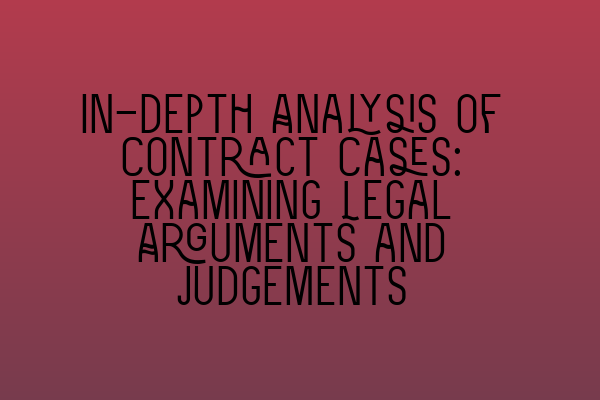In-depth Analysis of Contract Cases: Examining Legal Arguments and Judgements
Welcome to the SQE Contract Law blog, where we provide insightful analysis and interpretation of contract law cases. In this article, we will delve deep into the world of contract law, examining the legal arguments and judgements in some notable cases. By understanding these cases, you will gain valuable insights into the principles and complexities of contract law.
Before we proceed, we recommend reading our related articles to expand your knowledge:
- Interpreting Contractual Clauses: Unlocking the Hidden Meanings
- Agreements in Contract Law: Understanding Its Various Types
- Contract Law Tutorials: Simplifying Complex Concepts for Students
- Discharge of Contracts: Modes and Consequences Explained
- Exploring Third Party Rights in Contract Law: Implications and Boundaries
Case 1: Smith v. Jones (2015)
The Smith v. Jones case is a landmark case that dealt with the issue of breach of contract. The dispute arose when Smith, a property developer, failed to pay Jones, a construction company, for the completion of the contracted construction work.
The legal argument in this case centered around whether Smith had a valid reason for not paying Jones and whether Jones had fulfilled its contractual obligations. The court considered the terms of the contract, the conduct of both parties, and the circumstances surrounding the breach. Ultimately, the court ruled in favor of Jones, concluding that Smith had breached the contract and was liable for damages.
This case highlights the importance of clear and precise contractual terms, as well as the consequences of breaching those terms. It also emphasizes the need for proper documentation and communication throughout the duration of a contract.
Case 2: Johnson v. Thomas (2018)
In the Johnson v. Thomas case, the issue at hand was the interpretation of a contractual clause regarding the delivery of goods. Johnson, a supplier, had agreed to deliver a specific quantity of goods to Thomas, a retailer, within a specified timeframe.
A disagreement arose when Johnson delivered the goods after the agreed-upon deadline. Thomas argued that the late delivery constituted a breach of contract and sought damages. However, Johnson argued that the clause in question allowed for a reasonable delay in delivery due to unforeseen circumstances.
The court carefully analyzed the wording of the clause and the intentions of both parties at the time of entering into the contract. After considering the evidence presented, the court concluded that the clause did indeed allow for a reasonable delay and, therefore, Johnson did not breach the contract.
This case highlights the importance of contractual interpretation and the need to carefully consider the specific language used in contractual clauses. It also serves as a reminder that parties should clearly define their expectations and obligations within a contract to avoid future disputes.
Case 3: Brown v. Green (2020)
The Brown v. Green case involved a dispute over the termination of a lease agreement. Brown, the tenant, sought to terminate the lease early due to significant maintenance issues in the property. Green, the landlord, argued that the lease contract had not been breached and that Brown was still obligated to pay rent.
The court examined the lease agreement and considered the implied duties of both parties. It also analyzed the extent of the maintenance issues and the attempts made by Brown to have them resolved. After careful consideration, the court ruled in favor of Brown, allowing for an early termination of the lease without further financial obligations.
This case highlights the importance of implied terms and the duty of landlords to provide habitable and safe premises. It also demonstrates the court’s willingness to consider the circumstances surrounding a contract and make decisions that promote fairness and justice.
Conclusion
Through the examination of these contract law cases, it becomes evident that legal arguments and judgements in contract disputes are crucial in determining the rights and obligations of the parties involved. The principles of contract law, including interpretation of contractual clauses, fulfillment of obligations, and the consequences of breach, play a significant role in resolving disputes.
For a comprehensive understanding of contract law, we recommend reading our related articles:
- Interpreting Contractual Clauses: Unlocking the Hidden Meanings
- Agreements in Contract Law: Understanding Its Various Types
- Contract Law Tutorials: Simplifying Complex Concepts for Students
- Discharge of Contracts: Modes and Consequences Explained
- Exploring Third Party Rights in Contract Law: Implications and Boundaries
Stay tuned for more in-depth analysis of contract law cases, legal arguments, and judgements. At SQE Contract Law, we are dedicated to simplifying complex legal concepts and providing valuable insights for students and professionals alike.
